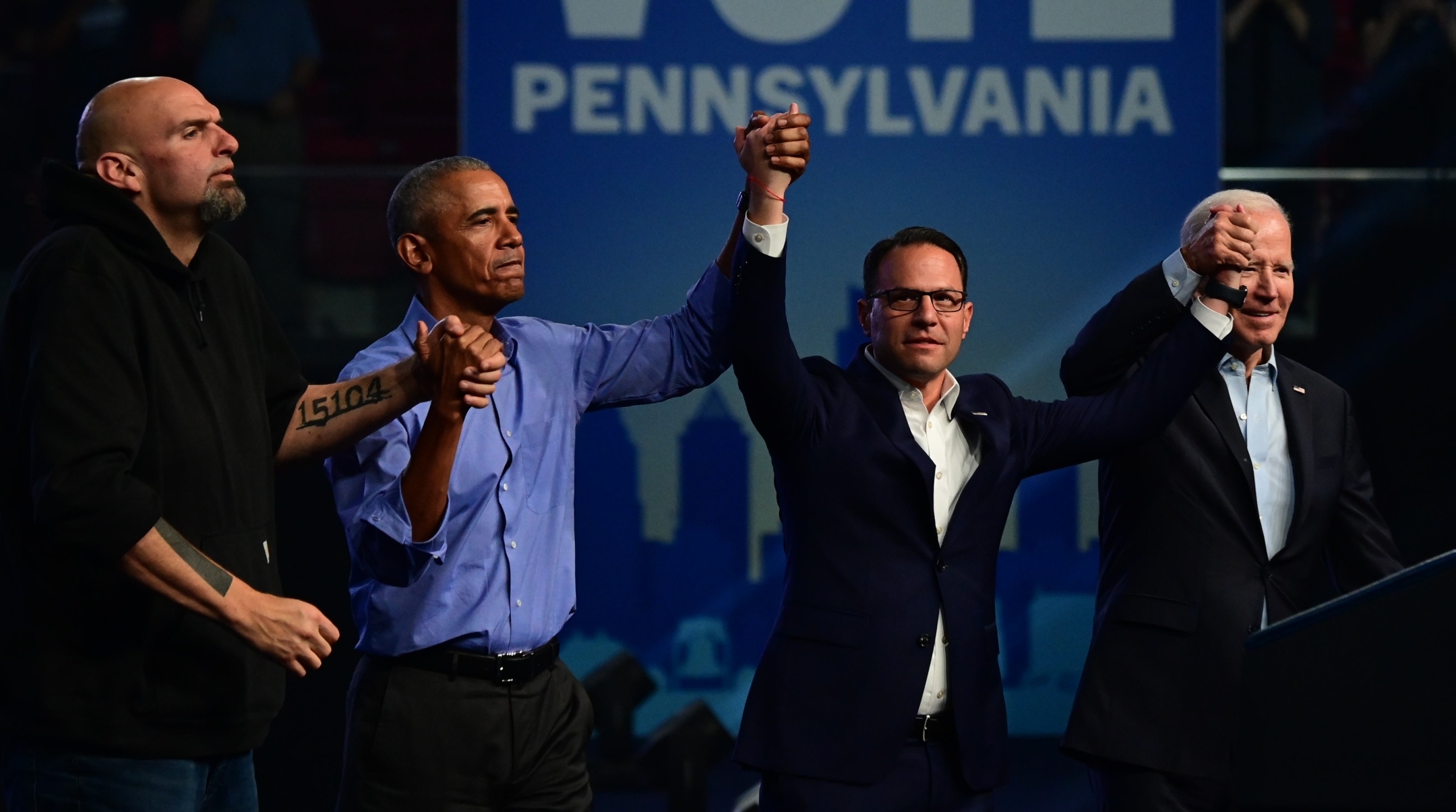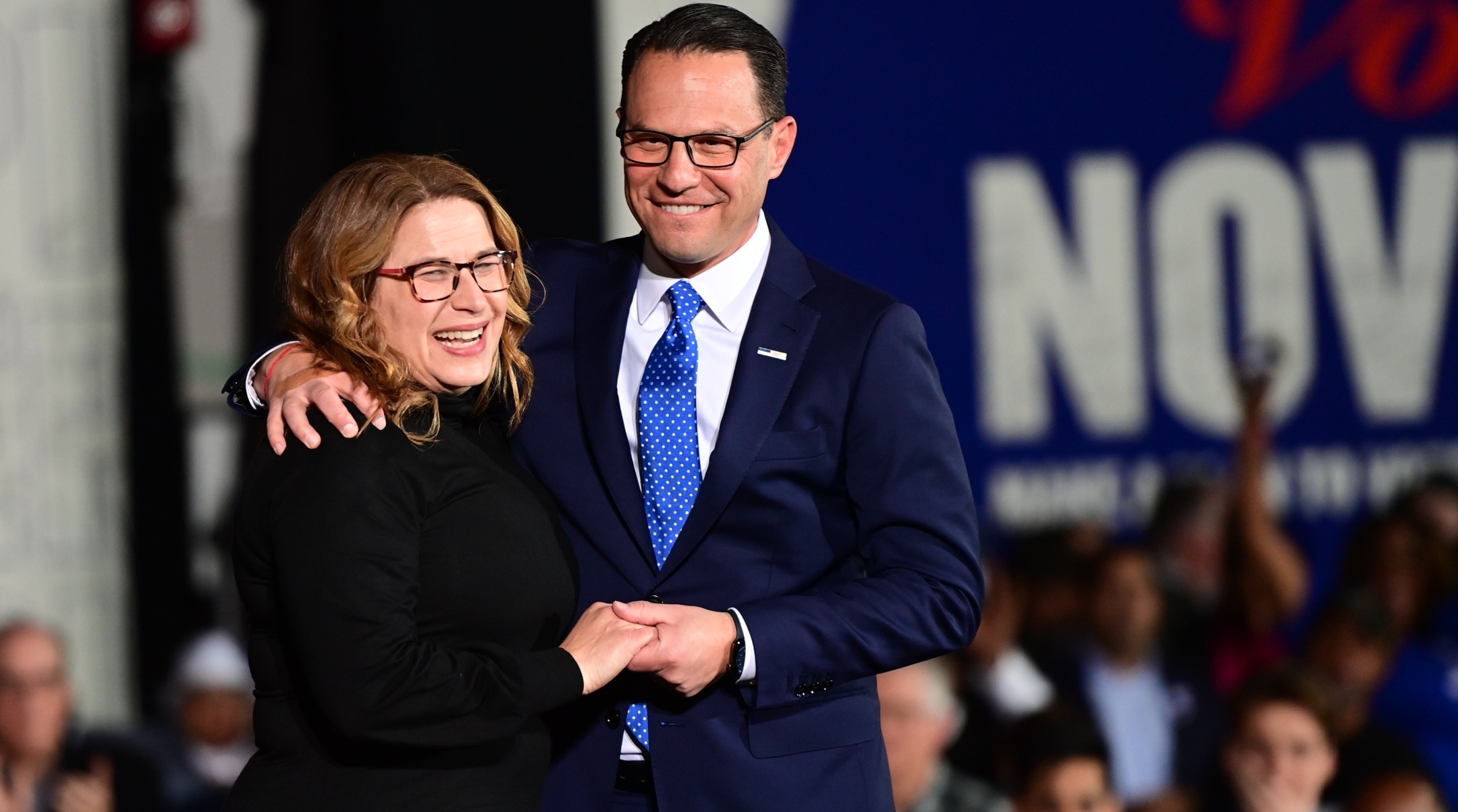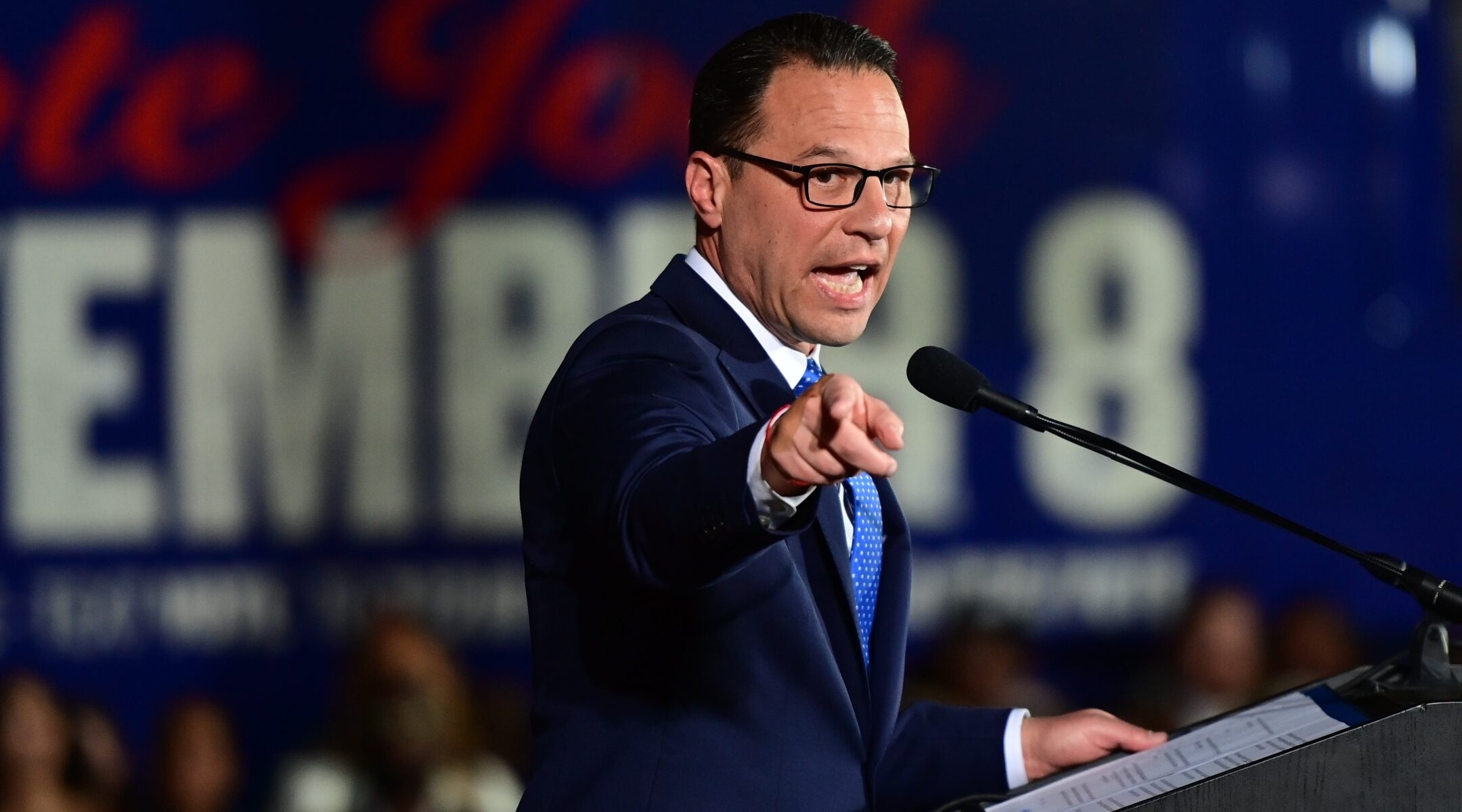(JTA) — On the day before he was set to be sworn in as Pennsylvania’s governor, Josh Shapiro had somewhere important to be: the Jewish community center in the state capital of Harrisburg.
Shapiro and his family spent Monday volunteering at the Alexander Grass Campus for Jewish Life, which was hosting a Martin Luther King Day celebration for the region.
It was an erev-inauguration stop that made sense for Shapiro, elected in November over a Republican whose campaign was continually mired in antisemitism allegations. From his stint as Pennsylvania’s attorney general to his gubernatorial campaign ads to his victory speech, Shapiro has long woven his Jewish identity into his politics — making him an archetype for a new breed of Jewish politician.
“They seem above politics because they exude pride,” said Scott Lasensky, a professor of American Jewish studies at the University of Maryland, about Shapiro and other Jewish politicians who demonstrate comfort with their identity. “It offers a much-needed respite from the reactive, defense posture that has seized the community.”
As Shapiro is sworn in Tuesday on a stack of three Hebrew Bibles — including the one that was on the bimah when a gunman massacred 11 Jewish worshipers in a Pittsburgh synagogue in 2018 — the novelty becomes reality: A Jewish day school grad and dad is now one of the most influential elected officials in the United States.
“You’ve heard me quote my scripture before, that no one is required to complete the task, but neither are we free to refrain from it, meaning each of us has a responsibility to get off the sidelines, to get in the game and to do our part,” Shapiro said in his victory speech in November, referring to the famous passage in Pirkei Avot, the compilation of ethical teachings excerpted from early Jewish writings.
It’s a speech that Shapiro’s friends, teachers and associates could have envisioned decades ago. In interviews with the Jewish Telegraphic Agency, nearly a dozen of them said Shapiro, 49, has openly melded Jewishness and activism since his early teens, practicing a politics of bringing together disparate communities with his Jewish identity at the core.
“He gets done what he needs to get done, what he wants to get done,” said Robin Schatz, the director of government affairs at the Jewish Federations of Greater Philadelphia. “And it is always in that framework of Jewish values.”
Schatz contrasted Shapiro’s openness about his Jewish identity with one of his Jewish predecessors as governor, Ed Rendell, for whom Schatz worked when Rendell was mayor of Philadelphia.
“Josh shows up for us just by being so proudly Jewish and that is really something because Rendell, who I worked for and who I love, I mean, he never hid his Jewishness, but he didn’t wear it on his sleeve,” she said.
Perhaps Shapiro’s most direct antecedent is Joe Lieberman, the Orthodox former Connecticut senator who was Al Gore’s vice presidential running mate in 2000. Lieberman, the first Jew on a major-party presidential ticket, recalled being ridiculed and questioned by Jewish groups for expressing his faith at campaign events.
That hasn’t happened for Shapiro, who is part of a relatively younger generation including congresspersons Elaine Luria of Virginia and Becca Balint of Vermont who express unabashed Jewish identities when campaigning among the broader public. Luria and two others just left Congress: Andy Levin of Michigan, who was defeated in last year’s primary after redistricting, and Ted Deutch, a Florida Democrat who made the transition this year to leading the American Jewish Committee. None of them wears a kippah on the campaign trail or strictly observes Shabbat, as Lieberman did, but all infuse Jewishness in their public comments and personas.
What separates Shapiro is his outsized success in a competitive race in a swing state — a record that has insiders bandying about his name as a potential presidential candidate one day.
Shapiro’s political orientation was apparent early on. Fresh out of his bar mitzvah, a 13-year-old Shapiro looked forward to his chats with Mark Aronchick, who was a leader with Josh’s parents, Steven and Judi, in the movement for Soviet Jewry in the Philadelphia area.
Shapiro centered his bar mitzvah on a letter-writing campaign to free a refusenik, a Jew whose intended emigration was blocked by the USSR’s cruel bureaucracy, and he liked to ask Aronchick about the movement, about organizing activism. But then the conversations took a turn Aronchick didn’t expect. Josh wanted to know about running a big city.
“I had been the chief lawyer for the city of Philadelphia in the early 80s,” recalled Aronchick, who became a mentor to Shapiro. “He was fascinated when we talked about that.”
In an interview last year with the Forward, after a campaign event with union organizers, Shapiro said he understood organizing as an effective tool when he was 6 and he joined his parents in campaigning for the release of Jews in the Soviet Union. (The refusenik who was the focus of Shapiro’s bar mitzvah activism made it out in time to attend Shapiro’s bar mitzvah, which earned Shapiro Philadelphia news coverage.) Shapiro’s parents “set a very good example for me to live a life of faith and service,” he said.

From left: Then-Democratic candidate for U.S. Senator John Fetterman, former President Barack Obama, Josh Shapiro and President Joe Biden at a rally at the Liacouras Center in Philadelphia, Nov. 5, 2022. (Mark Makela/Getty Images)
Sharon Levin taught Shapiro government at Akiba Hebrew Academy (now called Jack M. Barrack Hebrew Academy) and said he stood apart at an age when boys interested in politics tend to flex their intellectual muscles through outspoken opinions and grandstanding.
“This was a pretty difficult group of kids, I don’t mean problematic, but kids who like to argue, to debate every point,” she said. “And Josh believes in cooperation, I think of him in those days as a team-builder.”
Todd Eisenberg, now a Montgomery County judge, recalled playing basketball with Shapiro for the high school team.
“He was the point guard so he was always the leader of everything,” Eisenberg said. “And he would always try to get everybody involved and make everybody feel like they’re a part of the process.”
Eisenberg was impressed by Shapiro’s leadership but not surprised — Shapiro had been pulling together kids from across the playground since first grade, when they first met.
“You know how kids are in cliques or they’re picking on other kids, he was never like that,” he said. “He was always nice to everybody involved in everything.”
In high school, Eisenberg said, Shapiro organized a chapter of Students Against Drunk Driving. “I remember him standing up for everybody and being a part of everything,” he said.
Shapiro ran for student president and lost, to classmate Ami Eden (who is now CEO of the Jewish Telegraphic Agency’s parent company, 70 Faces Media). Shapiro has for decades told people it was the only race he lost.
Levin, his government teacher at Akiba, said Shapiro had a realistic assessment of his skills and what he needed to do to succeed. He went to the University of Rochester, qualifying for the Division III basketball team, but soon realized that excellence on the Akiba court was mediocrity in an NCAA setting, she recalled.
“So he said, ‘my fallback from school was government,’ and he was the first sophomore ever to be student president at the University of Rochester,” she said.
“I knocked on every door,” Shapiro recalled to Philadelphia Magazine in 2007.
From Rochester, he moved to a series of legislative aide positions in the 1990s on Capitol Hill, working for Pennsylvania Rep. Joe Hoeffel and New Jersey Sen. Robert Torricelli. His bosses remember a guy in his early 20s who was soon supervising staffers, and his colleagues recall not minding. Shapiro was pleasant, they say, but clearly on a track for greater things.
“No one ever worked for me who was as bright and focused, with such steely determination,” Torricelli told The Philadelphia Inquirer last year.
By the time he was 31, in 2004, Shapiro was running for his first elected position as a Pennsylvania state representative. He ran against Jon Fox, a Jewish Republican who had been a congressman. Shapiro impressed people in the district with his lowkey straightforwardness, said Betsy Sheerr, a Jewish lay leader and a Democrat who was friendly with both candidates, and that provided a contrast with Fox, who would shift his positions depending on the listener.
“We used to joke that John Fox was multiple choice, you know that one day he was pro-choice and the next day he wasn’t,” Sheerr recalled. “With Josh, there never has been any confusion about where he stands on things.”
Within two years, Shapiro rose to statewide prominence when he brokered a deal to break a deadlock in the state house, where Democrats had a one-seat majority. Under Shapiro’s plan, Democrats would back a moderate Republican, Denny O’Brien, to keep the scandal-plagued incumbent speaker, Republican John Perzel, from reelection. As soon as he got the job, O’Brien named Shapiro deputy speaker.
Shapiro’s backers cite the now-legendary episode as a sign of Shapiro’s leadership; his detractors say it is a signal of his self-promotion and gamesmanship. In 2008, Shapiro turned on a one-time mentor, Democratic state Rep. Bill DeWeese, saying he should step down from the party leadership because of corruption investigations. (DeWeese and Perzel both ended up serving time in prison.)
Schatz said Shapiro remained sensitive to the issues affecting the Jewish community, helping expand Medicare assistance for the elderly, instituting Holocaust education and targeting terrorist-backing countries like Iran for sanctions.
A moderate Democrat, he also stood out for breaking with the establishment. Aronchick recalled Shapiro in 2004 seeking the endorsement of Howard Dean, the former Vermont governor who was then a standard bearer for progressives.
“Josh is a consensus builder,” he said. “Others might think, ‘Do I look too progressive?’ It wasn’t a thought on Josh’s mind.”
In 2008, Shapiro was among just a handful of establishment Democrats who endorsed Barack Obama for president in a state that Hillary Clinton won in the primaries. Shapiro defended Obama when his former pastor Jeremiah Wright, came under fire for antisemitic comments.
Obama did well enough in the state, Shapiro told JTA at the time, that he believed he would do well nationally. “I think that demonstrates that the hype that Senator Obama had a problem with the Jewish community was just that — it was hype. It was not reality.” He would be proved right.
The Democratic machine killed off the “deputy speaker” title in 2009, leading the Philadelphia Jewish Exponent to muse, “The Once-Lofty Shapiro; Has He Been Brought Down a Few Pegs?”
But Matt Handel, a onetime Republican activist who left the party after Donald Trump was elected president, said that while Shapiro made enemies in the statehouse, he never let it get to him.
“He can be angry about things, you know, he can find them offensive. But if you watch him speak, he maintains control of what he says and how he responds,” said Handel, who interacted with Shapiro when Handel chaired the Pennsylvania Jewish Coalition, a statewide advocacy body.
Shapiro soon was looking elsewhere: He ran for and won a spot on the three-member Montgomery County Board of Commissioners, where he was elected chairman, effectively the mayor of the populous and prosperous suburban Philadelphia area.
Levin, his high school teacher, remembered a call Shapiro made when he was considering a run for the U.S. Senate.
“What he said was, if, if I end up going to Washington, I’m gonna do a Biden, you know, back and forth on the train, because it’s so important for my kids to remain at the school where I went to school.” A while later he called back.
He said, “You know, I’m not a legislator. I’m an executive.”
(Levin remains close to Shapiro and his family; last fall, she ran into Shapiro and his daughter Sophia, who led student outreach during his campaign, at an airport in San Antonio. “Look who I saw!” she said in an email, photos of hugs attached.)
In 2016, Shapiro was elected Pennsylvania attorney general. He led battles against Trump’s efforts to limit entry to the United States of people from a number of Muslim-majority countries, and to keep Trump acolytes from overturning his 2020 loss in the state. He also led a widely publicized investigation of child abuse in the Roman Catholic church.
Shapiro’s gubernatorial campaign launch last April was an ad in which he declared, “I make it home Friday nights for Sabbath dinner,” while the camera closed on challahs. It also stars his four kids and his wife, Lori, whom he refers to as his “high school sweetheart.”

Josh Shapiro embraces his wife, Lori Shapiro, on stage after giving a victory speech to supporters at the Greater Philadelphia Expo Center in Oaks, Penn., Nov. 8 2022. (Mark Makela/Getty Images)
Shapiro’s ultimate victory was especially sweet to many Jews because he defeated a Republican, Doug Mastriano, who had centered Shapiro’s Jewishness, but not in a positive way. Mastriano had allied with an outspoken antisemite, Andrew Torba, the founder of the far-right social media site, Gab, paying for promotion on Gab and accepting a donation from Torba. (Mastriano renounced antisemitism, but pointedly, not Torba.) Mastriano also mocked the Jewish school Shapiro attended and where he sends his four children.
It is a source of delight to Shapiro and his backers that his open Jewish identity did not alienate Pennsylvanians; indeed, he fared well in the conservative center of the state, a fact that his campaign boasted about in an email sent to the media a week after the election, when most campaigns are wrapping up business.
“Josh Shapiro won Beaver, Berks, Cumberland, and Luzerne counties — significantly outperforming Joe Biden’s margins in 2020 and flipping those counties blue,” the campaign said, attaching a chart showing the flips. “From the very beginning of his campaign, Josh vowed to go everywhere. That meant campaigning heavily where other Democrats don’t often win and investing in communities across the state.”
Jill Zipin, a longtime Shapiro backer who leads Democratic Jewish Outreach Pennsylvania, said Mastriano’s Christian nationalism did not play well in a state that was founded on religious freedoms. “Pennsylvania was founded on religious pluralism, it was founded by Quakers,” she said. “Anyone of any religious stripe was welcome.”
Mastriano’s team, toward the end of the campaign, appeared to notice the resonance Shapiro’s beliefs had among Pennsylvanians. His surrogates pivoted to claiming Shapiro was not a genuine Jew, with one consultant saying Shapiro’s defense of abortion rights made him inauthentic, and Mastriano’s wife claiming she and her husband loved Israel more than Jews did.
The moves may have backfired, said Schatz. Shapiro’s Jewish expression, she said, “was a way of actually relating to religious conservatives. They say that ‘maybe he doesn’t follow our religion, but because he does have a belief, he’s a religious person.’”
In a sign of his polish with Pennsylvanians, Shapiro’s margin of victory was substantially wider than that of John Fetterman, the Democrat elected to the state’s open Senate spot.
“While we won this race — and by the way, we won it pretty convincingly — I want you to know, the job is not done, the task is not complete,” Shapiro said during his victory speech, prompting 15 seconds of cheers and applause.
Shapiro has stayed largely out of the public eye since his election, instead focusing on putting together a transition team and preparing for his inauguration on Tuesday. He did not respond to JTA’s requests for an interview.
That transition team bears signs of Shapiro’s long and deep Jewish ties. Marcel Groen, a retired attorney on the economic development advisory committee, first met the new governor because he attended synagogue with Shapiro’s father. He became a mentor to the inchoate politician, who several years ago recruited Groen’s mother, a Holocaust survivor, to speak to incarcerated teens.
During the encounter, which Groen and Shapiro did not make public at the time, the teens went from standoffish to hugging 93-year-old Sipora Groen after hearing her story. (Sipora died in 2017.) It was, Groen said, typical of Shapiro’s approach to changing hearts and minds: “Josh realized that’s how you reach kids who got in trouble and who needed to understand life in a different manner,” he recalled.
Shapiro’s plans for his inauguration are laced with Jewish significance. In addition to the Tanakh from the Tree of Life synagogue, his swearing-in will reportedly take place on a Bible used by a Jewish soldier from Pennsylvania in World War II.
But asked by CNN’s Dana Bash after the election if he wanted to make history as America’s first Jewish president, Shapiro demurred.
“I have an ambition to get a little bit of sleep, to reintroduce myself to my kids, and then to serve the good people of Pennsylvania as their governor,” he said.
JTA has documented Jewish history in real-time for over a century. Keep our journalism strong by joining us in supporting independent, award-winning reporting.






